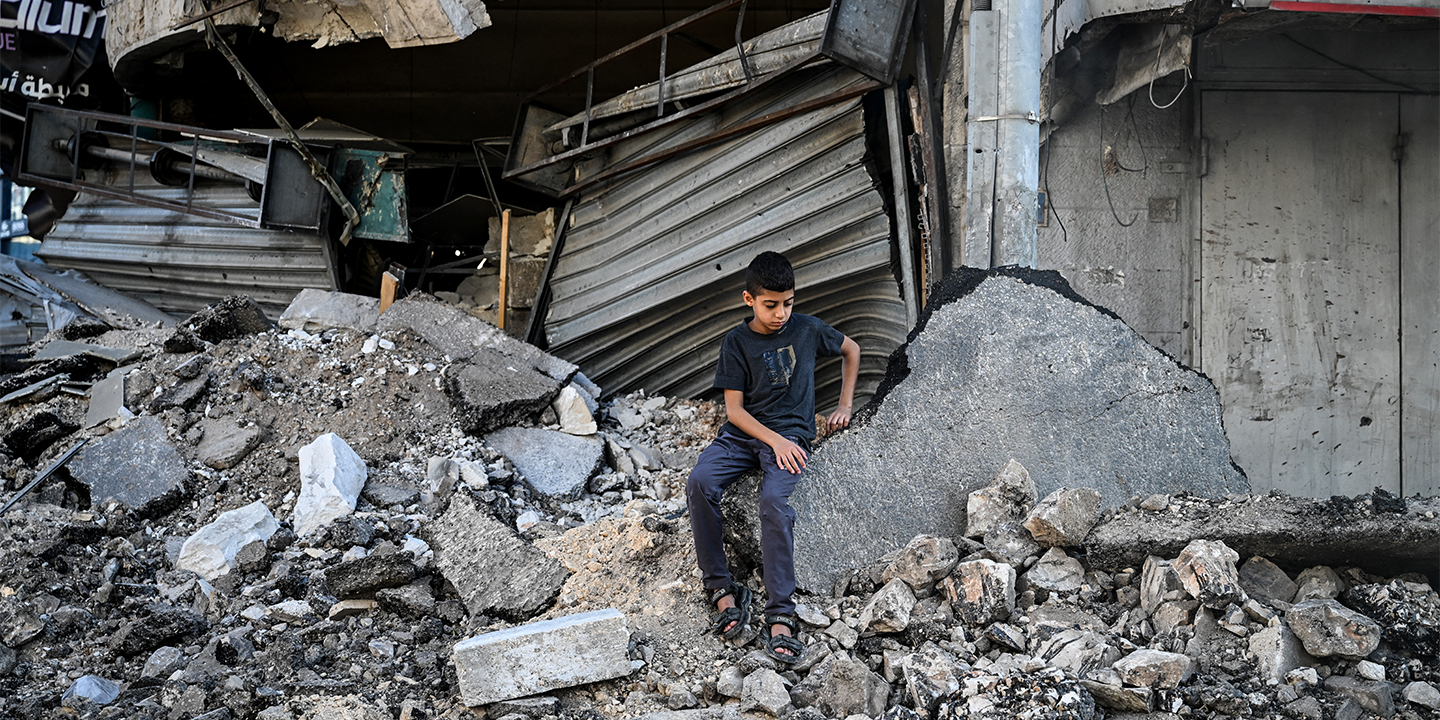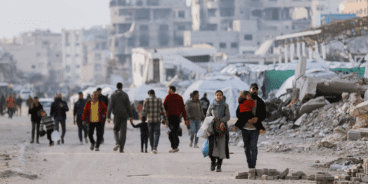

Atrocity Alert No. 409: Israel and the Occupied Palestinian Territory, Sudan and China
Atrocity Alert is a weekly publication by the Global Centre for the Responsibility to Protect highlighting situations where populations are at risk of, or are enduring, mass atrocity crimes.
ISRAEL CONDUCTS DEADLY RAIDS IN OCCUPIED WEST BANK AS ASSAULT ON GAZA CONTINUES
Under the stated aim of targeting Palestinian militants, between 28 August and 6 September Israeli forces dramatically increased their systematic use of unlawful force with militarized operations and “lethal war-like tactics” in the Occupied West Bank governorates of Jenin, Tulkarem and Tubas, including in refugee camps. At least 36 people were killed, including eight children, and civilian infrastructure was significantly damaged, including through successive airstrikes and use of bulldozers and snipers supported by fighter jets, drones and ground forces. Thousands of Palestinians were displaced.
During the large-scale operations, ambulances evacuating the wounded were stopped on the way to hospitals, as Israeli soldiers searched for militants. Israeli soldiers also conducted extensive raids, detaining dozens, as well as rounding up young Palestinians from their homes and subjecting them to various forms of mistreatment. The Office of the UN High Commissioner for Human Rights warned that Israel’s tactics “give rise to grave concerns of a systematic disregard for the rights of the Palestinian population.”
The situation in the Occupied West Bank has rapidly deteriorated since 7 October, as Israeli forces have increasingly used violent tactics during search-and-arrest operations and raids. Since 7 October at least 658 Palestinians have been killed in the Occupied West Bank, including East Jerusalem, by Israeli forces. Prior to 7 October, Israeli security forces routinely deployed lethal force against Palestinians, including through frequent violent raids on refugee and displacement camps.
Meanwhile, Israeli bombardment continues across the Gaza Strip. On 10 September airstrikes on densely populated Al-Mawasi – an Israeli-designated so-called humanitarian zone in the southern city of Khan Yunis – killed and injured scores of people. Residents and medics said the camp was struck by five or six missiles or bombs, setting tents ablaze and burying Palestinian families under sand. The strike was among the deadliest yet in Al-Mawasi, where hundreds of thousands of Palestinians had previously been ordered by Israel to shelter.
Eleven months on, at least 40,972 Palestinians have been killed – including almost 16,500 children – according to the Ministry of Health in Gaza. At least 1.9 million people have been forcibly displaced, many multiple times due to successive “evacuation orders.” On 9 September the Israeli military issued a new evacuation order which includes areas where local pauses had been agreed for polio vaccination.
Israel must comply with all obligations under international law, including those as an occupying power, end its unlawful settlement project and ensure the safety and security of the Palestinian population. In line with recent International Court of Justice (ICJ) findings, Israel must end its unlawful presence in the Occupied Palestinian Territory as rapidly as possible. Ensuring the unimpeded and safe flow of humanitarian aid at scale throughout Gaza must be paramount, including through Israel’s immediate implementation of all provisional measures orders issued by the ICJ.
UN FACT-FINDING MISSION OUTLINES WAR CRIMES AND CRIMES AGAINST HUMANITY IN SUDAN
On 5 September the Human Rights Council (HRC)-authorized Independent International Fact-Finding Mission (FFM) for the Sudan published its first report. The report outlines grave violations of International Human Rights Law (IHRL) and International Humanitarian Law (IHL) by the Sudanese Armed Forces (SAF), the Rapid Support Forces (RSF) and their allied militias, concluding that many of these violations may amount to war crimes and crimes against humanity. Expert Member Joy Ngozi Ezeilo stressed, “The people of the Sudan have suffered unimaginable tragedy. A sustainable ceasefire must be prioritized to halt the fighting in which the civilian population is caught.”
The report, which examines the situation in Sudan since the outbreak of the conflict in April 2023, documents intense artillery shelling and airstrikes on civilian homes, medical clinics, schools and internally displaced persons camps across Sudan. The FFM warned that those supplying arms may be complicit in these grave violations of IHL and IHRL. The report also highlights the widespread use of sexual violence, arbitrary arrests and detention, cruel treatment and torture, murder of all kinds, recruitment and use of children, as well as pillaging and looting of property.
The findings of the report confirm that in certain regions, particularly in West Darfur, people were deliberately targeted based on their ethnicity. This includes large-scale attacks by the RSF and allied militias against non-Arab communities, particularly the ethnic Massalit population in El-Geneina. Women were assaulted, raped and robbed because of their ethnicity, demonstrating a horrifying pattern of sexual and gender-based violence.
Mohamed Chande Othman, Chair of the FFM, stated, “The gravity of these findings underscores the need for urgent and immediate action to protect civilians.” The FFM recommended the deployment of an independent and impartial force with a mandate to protect civilians. It also provides a detailed list of options for ensuring accountability and access to justice for victims.
Today the UN Security Council (UNSC) renewed Sudan’s sanctions regime – including targeted sanctions and an arms embargo – for one year without any changes. Despite calls from civil society and recommendations by the FFM, the UNSC missed an important opportunity to expand the existing arms embargo to all of Sudan and consider including sexual and gender-based violence as a stand-alone listing criterion within the sanctions regime. The UNSC should expand the jurisdiction of the International Criminal Court – which currently only applies to Darfur – to cover the entire country. Given the severity of the situation and the impact of the UN’s liquidity crisis on resources and staffing, during the current session the HRC must extend the FFM’s mandate for at least one year to ensure the Mission can continue its vital work.
UN HUMAN RIGHTS CHIEF ISSUES STATEMENT ON CHINA TWO YEARS AFTER XINJIANG REPORT
On 27 August the Office of the UN High Commissioner for Human Rights (OHCHR) released an update on its work on China ahead of the second anniversary of the former High-Commissioner’s long-awaited report on the human rights crisis in the Xinjiang Uyghur Autonomous Region (the Uyghur Region). The updated report confirmed that “many problematic laws and policies remain in place,” which may enable serious human rights violations to continue. The 2022 report presented evidence of atrocities against Uyghur populations and members of other predominantly Muslim groups, concluding that the Chinese government may be perpetrating crimes against humanity.
In the update OHCHR called on the Chinese government to undertake a full review, from a human rights perspective, of the legal framework governing national security and counterterrorism, as well as strengthen the protection of minorities against discrimination. Since 2016, under the guise of counterterrorism and combating religious extremism, Chinese authorities have pursued multiple discriminatory and repressive measures targeting religious and ethnic minority groups. This includes mass arbitrary detention – often accompanied by widespread rape, sexual abuse and torture – severe restrictions on religious freedom and practice and coercive birth control measures, such as forced abortions and sterilizations.
Over the past two years China has continued to deny allegations of human rights abuses, dismissing the 2022 report as an isolated initiative. However, the UN system has consistently raised concern about the situation facing religious and ethnic minorities in China, particularly in the Uyghur Region and Tibet. UN Special Procedures have provided extensive documentation of ongoing abuses and the Committee on the Elimination of Racial Discrimination (CERD) referred the situation to the Office on Genocide Prevention and the Responsibility to Protect (OSAPG). Member states have also raised concern during successive cycles of China’s Universal Periodic Review.
Julia Saltzman, China expert at the Global Centre for the Responsibility to Protect, said, “The Chinese government must swiftly develop and implement a clear roadmap with a defined timeline to act on the recommendations from OHCHR and other UN human rights bodies and mechanisms. This includes allowing unrestricted access for UN experts and immediately ending all forms of reprisals or intimidation against individuals who dare to speak out against ongoing violations.” Relevant UN officials, including the High Commissioner, should ensure maximum international scrutiny and consistently advocate for implementation of these and other recommendations in their engagement with China.
As the 57th session of the UN Human Rights Council continues, member states should actively work towards formalizing public discussions at the Council on ongoing atrocity crimes in the Uyghur Region and other likely violations in Tibet and engage with the OSAPG on tangible next steps regarding the CERD referral.
Related Content


Atrocity Alert No. 433: Israel and the Occupied Palestinian Territory, Myanmar (Burma) and Mali
